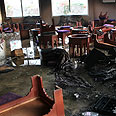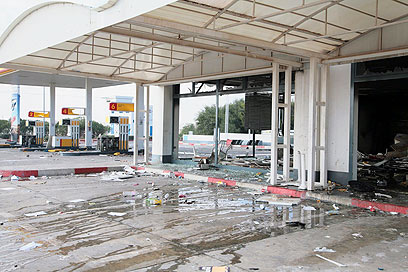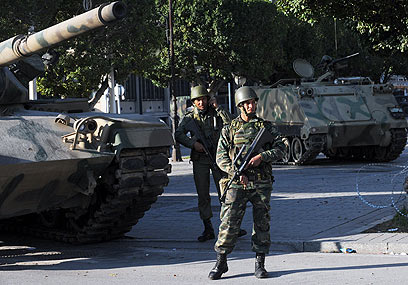
Tunisia gunbattles continue; Syria, Jordan fear revolts
Prime Minister Ghannouchi says new national unity government likely to be announced Monday. Meanwhile, Syria sharply raises key subsidy in reversal of policy; Jordanian government announces $225 million package of cuts in fuels, staple products prices
Major gunbattles erupted outside the palace of Tunisia's deposed president, in the center of the capital, in front of the main opposition party headquarters and elsewhere on Sunday as authorities struggled to restore order and the world waited to see if the North African nation would continue its first steps away from autocratic rule.
Meanwhile, Deputy Foreign Minister Daniel Ayalon met with Britain's Minister for the Middle East Alistair Burt Sunday and asked him to convey a message to Tunisians urging them to safeguard the Jewish community's security at a time of uncertainty.
Police arrested dozens of people, including the top presidential security chief, as tensions appeared to mount between Tunisians buoyant over Zine El Abidine Ben Ali's departure and loyalists in danger of losing major perks.
There were cheers and smiles in much of Tunis, the capital, as residents tore down the massive portraits of Ben Ali, some of them several stories high, that hung from lampposts and billboards and were omnipresent during his 23-year reign.

Evidence of riots (Photo: AFP)
Prime Minister Mohamed Ghannouchi said on state TV that a new national unity government will "most certainly" be announced Monday "to open a new page in the history of Tunisia."
There are three legal opposition parties that could be included in the government Ghannouchi has been directed to form by the interim president, Fouad Mebazaa. Negotiations are advanced, Ghannouchi said Sunday night.
Syrians raising subsidies
Syrian authorities sharply raised a key subsidy on Sunday in a reversal of policy after Tunisia's president was driven from power by unrest over soaring prices, unemployment and state repression.
The Syrian government, which has been controlled by the Baath Party since it took power in 1963, announced it had increased the heating oil allowance for public workers by 72% to the equivalent of $33 a month.
The government had hitherto been slashing subsidies as it lifts bans on private enterprise to try and repair decades of economic stagnation and draw back capital.
In neighboring Jordan, the state announced a $225 million package of cuts in the prices of several fuels and staple products including sugar and rice.
Syrian Finance Minister Mohammad al-Hussein said the increase in the heating oil allowance would cost the state $326 million a year, benefiting two million public workers and retirees out of a population of 20 million.
"This liquidity will have a positive impact on economic activity," Hussein told Syria's official news agency.
Meanwhile, Islamists in Jordan, emboldened by protests in Tunisia called on Sunday for an end to what they called authoritarian rule in their country.
Nearly one thousand Islamist and some leftist demonstrators rallied in front of parliament, to protest price rises and free-market reforms they blame for worsening the plight of the poor in the country of 7 million.
The rally was called by the influential Muslim unions, a bastion of opposition to the kingdom's pro-Western policies. Protesters called for the downfall of Prime Minister Samir Rifai's government, pointing to Tunisia as an example.
Some analysts have said the moves are designed to head off the kind of unrest seen in Algeria and Tunisia from rising food prices and worsening living conditions.
Growing violence
Worries among Tunisians, grew with the violence and worsening shortages of essentials such as milk, bread and fresh fish.
"We're starting to feel it now," said Imed Jaound at the Tunis port, which has been closed since Friday, when Ben Ali fled to Saudi Arabia.
Other gunfights broke out near the PDP opposition party headquarters and a two-hour-long gunbattle raged behind the Interior Ministry, long feared during Ben Ali's reign as a torture site. Residents of the city center heard constant volleys of gunfire throughout much of the afternoon; they were ordered to stay away from windows and keep their curtains closed.
The prime minister said Sunday night that police and the army have arrested numerous members of armed groups, without saying how many.
"The coming days will show who is behind them," Ghannouchi said. He added that arms and documents have been seized from those arrested.
"We won't be tolerant towards these people," the prime minister said.

Soldiers in capital Tunis (Photo: AFP)
The security chief, Ali Seriati, and his deputy were charged with a plot against state security, aggressive acts and for "provoking disorder, murder and pillaging," the TAP state news agency reported.
Police stopped vehicles as the city remained under a state of emergency. More than 50 people were arrested on suspicion of using ambulances, rental cars and government vehicles for random shootings, a police official told The Associated Press. A crowd of 200 in Tunis cheered one such arrest Sunday.
Before the gunbattle at the opposition party headquarters, police arrested a group of nine Swedish boar hunters traveling in taxis toward a nearby hotel after their flight home was canceled, one of the Swedes, Ove Oberg, said. Police roughed the men up and accused them of being terrorists, Oberg said, recounting his ordeal before a group of journalists.
Six of the men were released, some with their clothes stained with blood, while three others remained in police custody Sunday evening.
A Paris-based photojournalist, Loucas Mebrouk von Zabiensky, 32, of the EPA photo agency, was in critical condition after being hit in the face Friday with a tear gas canister, according to a French consular official in Tunisia. The official, speaking on condition of anonymity because of embassy rules, did not provide other details or an explanation of an earlier announcement that the photographer had died.
Mebazaa, a former parliament speaker who was sworn in as interim president Sunday, has told Ghannouchi to create a national unity government and urged him to consult with the opposition, who were marginalized under Ben Ali. Presidential elections are to be held in 60 days.
Tunisia's foreign minister will brief Arab leaders meeting in Egypt this week on the upheaval surrounding Ben Ali's ouster.
Leaked US diplomatic cables released by WikiLeaks had discussed the high levels of nepotism and corruption displayed by Trabelsi's clan. But US State Department spokesman P.J. Crowley rejected any notion that WikiLeaks disclosures led to the revolution in Tunisia, saying Sunday that Tunisias were already well aware of the graft, nepotism and lavish lifestyles of the former president and his relatives.
Tunisian media reported one brother-in-law of the president, Imed Trabelsi, was attacked by an angry mob at Tunis airport and died. The reports could not be immediately confirmed.
Reuters, Associated Press and Ronen Medzini contributed to this report
- Follow Ynetnews on Facebook










